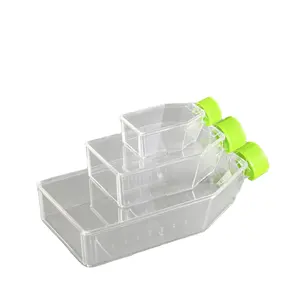
SORFA Lab Tissue Culture Flask 75 Vent Cap Sterile Screw Cap Cell Culture Flask For Cell Suspension Culture

Suzhou Factory Wholesale TC Treat 225 Cm2 T75 Flask Cell Culture Flask 25 Cm2 175 Cm2 Square Culture Flask With Vent Caps Or Sea






Cell culture flasks are a cornerstone in biological research and industrial applications, serving as a vessel for the growth and maintenance of cell cultures. These flasks come in various sizes and designs, each tailored to specific types of cell cultivation and laboratory requirements. The tissue culture flask, for instance, is designed to optimize the growth of tissue cells with features that support adhesion and proliferation.
The cell culture flask category encompasses a range of models, including the t25 flask and t75 flask, which refer to the growth area in square centimeters. Larger flasks such as the t150 flask and t225 flasks are suited for scaling up experiments or industrial production. Each flask type is crafted to cater to the varying needs of cell culture processes, whether for educational purposes or high-throughput pharmaceutical manufacturing.
A key feature of cell culture flasks is the material composition. Flasks like the Corning flask are often made from specialized plastics that are BPA-free, ensuring biocompatibility and safety in cell culture environments. Stainless steel options are also available, prized for their durability and resistance to corrosion, making them a long-lasting choice for rigorous laboratory use.
The application of cell flasks is diverse, ranging from academic research to biotechnological applications. The t75 cell culture flask is commonly used in laboratories for medium-scale cell growth, while shake flasks cell culture techniques are employed in suspension cultures, where constant agitation is necessary for cell growth.
The design of a cell culture bottle can significantly impact its functionality. Features such as hinge-connected caps prevent contamination while allowing for easy access. The lightweight yet sturdy construction of these flasks facilitates ease of handling without compromising on the structural integrity or the safety of the cell cultures within.
Selecting the appropriate cell culture flask sizes is crucial for the success of any culturing task. The t flask cell culture design, for example, is tailored for straightforward handling and stacking, which is essential for efficient use of incubator space. Understanding the specific requirements of your cell culture process will guide you in choosing the most suitable flask for your laboratory needs.